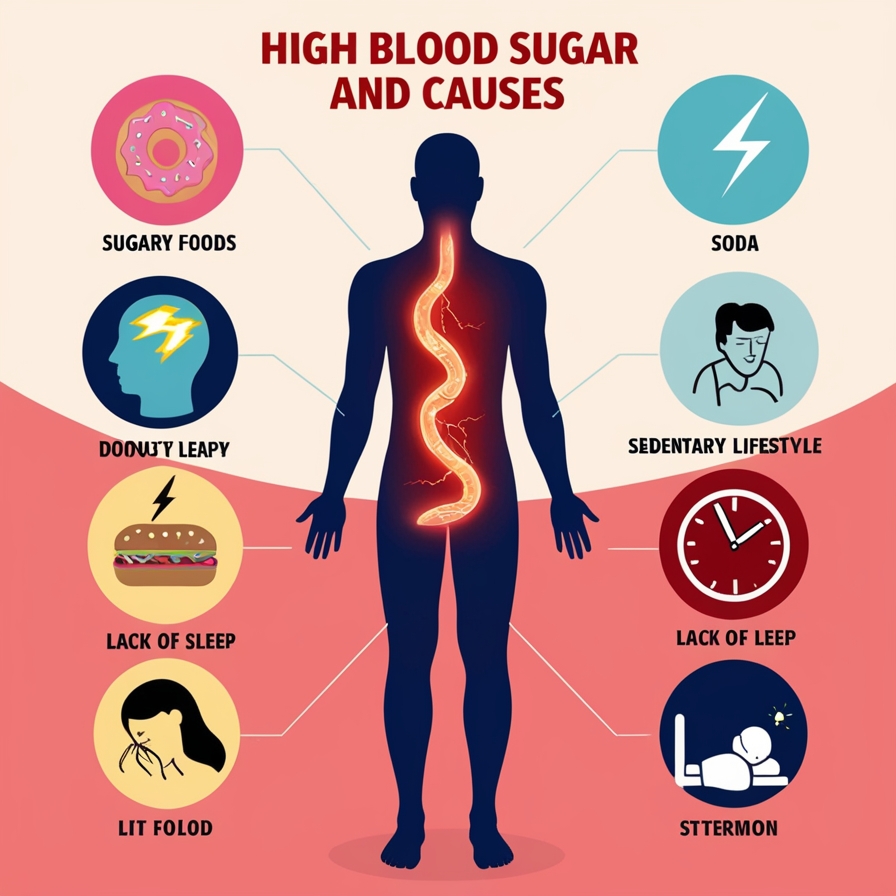High blood sugar, also known as hyperglycemia, happens when there is too much glucose (sugar) circulating in the bloodstream. While sugar is essential as a source of energy for the body, persistently high blood sugar levels can lead to serious health problems, to prevent complications, it’s important to understand what causes high blood sugar and how it can be managed effectively.
What Is High Blood Sugar?
High blood sugar occurs when the body either does not produce enough insulin or cannot use it effectively, Insulin is a hormone that helps move glucose from the blood into cells, where it is used for energy, when insulin is not functioning properly, glucose builds up in the bloodstream, leading to hyperglycemia.
Common Causes of High Blood Sugar
1. Diabetes
-
Type 1 Diabetes. This is an autoimmune condition where the immune system attacks insulin producing cells in the pancreas, leading to little or no insulin production, without insulin, blood sugar levels can rise quickly.
-
Type 2 Diabetes. This occurs when the body becomes resistant to insulin or does not produce enough of it, It is often linked to lifestyle factors such as poor diet, lack of exercise, and being overweight.
2. Dietary Factors
-
Consuming excessive amounts of sugary foods, refined carbohydrates, or large meal portions can cause blood sugar spikes.
-
Skipping insulin or other diabetes medications when eating high carb meals can also contribute to high blood sugar levels.
3. Physical Inactivity
-
Exercise helps the body use insulin more effectively, a sedentary lifestyle can lead to poor insulin sensitivity, resulting in higher blood sugar levels,
-
Is your blood sugar trying to tell you something?
(Read More Here) to uncover the warning signs before it’s too late
4. Stress
-
Both physical and emotional stress trigger the release of hormones like cortisol and adrenaline, which can increase blood sugar levels, stress management is key to maintaining stable blood sugar levels.
5. Illness or Infection
-
When you’re sick, your body releases stress hormones to fight the illness, which can cause blood sugar levels to rise, Infections and fevers often make blood sugar harder to control, especially for people with diabetes.
6. Medications
-
Certain medications, such as corticosteroids e.g, prednisone diuretics, and beta blockers, can interfere with blood sugar regulation and cause it to rise.
7. Hormonal Imbalances
-
Conditions like cushing’s syndrome excess cortisol production, polycystic ovary syndrome (PCOS) and hyperthyroidism can disrupt insulin function and lead to elevated blood sugar levels.
8. Overeating or Binge Eating
-
Consuming large quantities of food, particularly high sugar or high carb meals, can overwhelm the body’s ability to regulate blood sugar effectively.
9. Dehydration
-
When the body is dehydrated, glucose becomes more concentrated in the blood, causing blood sugar levels to rise temporarily, drinking enough water is essential for maintaining healthy blood sugar levels.
10. Lack of Sleep
-
Poor or insufficient sleep affects the body’s ability to use insulin efficiently, this can lead to insulin resistance and higher blood sugar levels over time.
How to Prevent and Manage High Blood Sugar
Managing blood sugar is crucial for overall health, especially for people at risk of diabetes or those already diagnosed, here are some practical tips.
-
Follow a Balanced Diet.
-
Focus on whole, unprocessed foods like vegetables, fruits, lean proteins, and whole grains.
-
Limit refined sugars and carbohydrates that cause blood sugar spikes.
-
-
Stay Physically Active.
-
Engage in regular exercise, such as walking, swimming, or cycling, physical activity improves insulin sensitivity and helps regulate blood sugar levels.
-
-
Hydrate Properly.
-
Drink plenty of water throughout the day to prevent dehydration and help the body process glucose efficiently.
-
-
Manage Stress.
-
Practice stress reduction techniques like meditation, yoga, or deep breathing exercises to lower stress hormones that can affect blood sugar.
-
-
Monitor Blood Sugar Levels.
-
If you have diabetes or are at risk, use a blood glucose monitor to track your levels regularly, this helps identify patterns and manage spikes more effectively.
-
-
Get Enough Sleep.
-
Aim for 7-9 hours of quality sleep each night to support overall health and insulin function.
-
-
Consult Your Doctor.
-
If you are on medications that affect blood sugar or experiencing frequent hyperglycemia, talk to your healthcare provider about adjustments to your treatment plan.
-
The Bottom Line
High blood sugar can result from a combination of lifestyle factors, medical conditions, and environmental triggers, by understanding these causes and taking proactive steps to manage your health, you can prevent complications and maintain stable blood sugar levels, small consistent changes in diet, exercise, and daily habits can make a significant difference in your overall well-being.
Do you have any questions about managing blood sugar or tips that have worked for you? share your thoughts in the comments, and don’t forget to share this article with others who might benefit from it.

